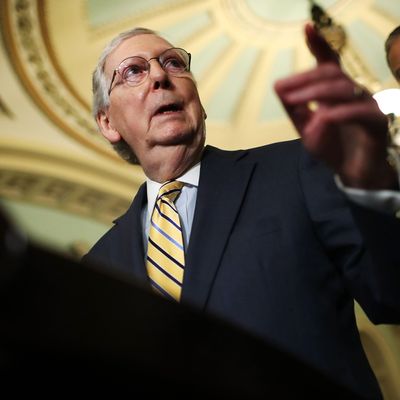
Senator Mitch McConnell said on Tuesday that he would not reconsider his opposition to reparations in light of an NBC News report identifying two of his great-great-grandfathers as slave owners. “I find myself once again in the same position as President [Barack] Obama,” the Kentucky Republican told reporters. “We both oppose reparations and we both are the descendants of slave owners.”
The response was McConnell’s glibbest yet on a subject he’s repeatedly dismissed. “I don’t think reparations for something that happened 150 years ago, when none of us currently living are responsible, is a good idea,” he said in June, the day before a House Judiciary Committee hearing on subject was scheduled to begin. “We’ve tried to deal with our original sin of slavery by fighting a civil war, by passing landmark civil rights legislation. We’ve elected an African-American president.”
McConnell’s invocation of Obama is ironic, in part, because he openly obstructed the president’s legislative agenda when he was in office, denying hearings to one of Obama’s Supreme Court nominees and famously committing to making him a “one-term president.” But it verges on cruel considering an obvious distinction: Had Obama been the black descendant of a white slave owner during the antebellum era, he almost certainly would have been a slave. McConnell, on the other hand, would not only have directly reaped the benefits of slave-generated wealth, but likely become a slave owner himself through inheritance.
A survey of Obama’s actual comments about reparations reveal further disagreement with the Kentucky senator. Where McConnell implied that measures undertaken already were reparations enough — including Obama’s election, which he opposed — the president has alternately advocated for investments in education and expressed worry that reparations could become an excuse for ignoring subsequent inequality. “I fear that reparations would be an excuse for some to say ‘we’ve paid our debt’ and to avoid the much harder work of enforcing our anti-discrimination laws in employment and housing,” Obama said in 2007. “[The] much harder work of making sure that our schools are not separate and unequal; the much harder work of providing job training programs and rehabilitating young men coming out of prison every year.”
None of these approaches are mutually exclusive, to be sure, but broadly speaking, there is a divergence between Obama and McConnell over whether black Americans are owed anything at all from a government that facilitated their enslavement, sanctioned their lynching en masse, enforced their degradation and murder under Jim Crow, and their segregation and impoverishment through redlining and police violence. Speaking at the House Judiciary hearing last month, writer Ta-Nehisi Coates argued that these actions constitute an inheritance to which all of America has a claim, and by extension, is responsible for addressing. “[If] Thomas Jefferson matters, so does Sally Hemings,” said Coates, indicating that Americans cannot selectively deny the valence of history because it’s unflattering. “[If] D-Day matters, so does Black Wall Street.”
According to NBC News, McConnell’s forebears — James McConnell and Richard Daley — owned a combined 14 enslaved black people, all but two of them women, in Limestone County, Alabama, shortly before the outbreak of the Civil War. McConnell has said that “it would be pretty hard to figure out who to compensate” for slavery should reparations be seriously undertaken. That now seems to be well within his reach, should he choose to ask around at his next family reunion.






























